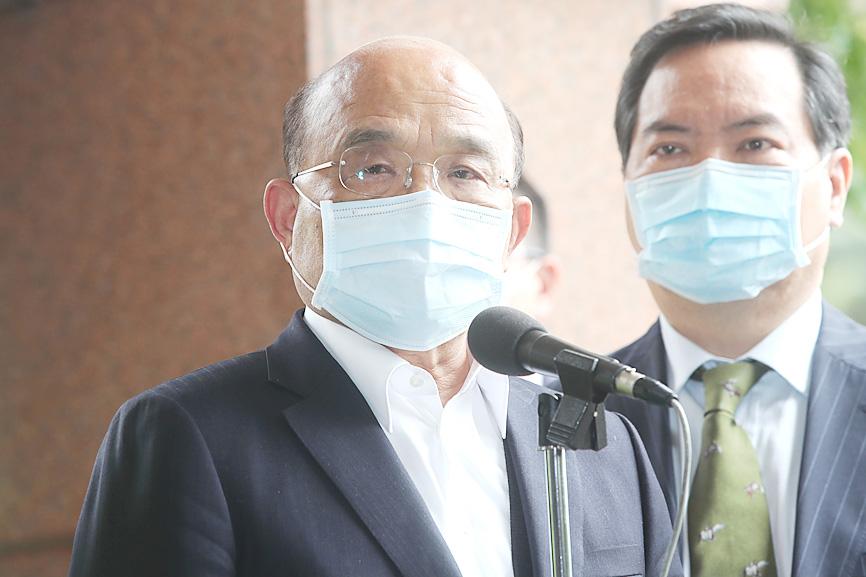The Executive Yuan’s Board of Science and Technology on Thursday announced plans to cement Taiwan’s leading position in semiconductor manufacturing, amid an ongoing global chip shortage that has highlighted the importance of the industry.
The plans, outlined in a report titled “The Taiwan Semiconductor Industry’s Forward-Looking Research and Talent Layout Amid the US-China Technology War,” were presented during a Cabinet meeting led by Premier Su Tseng-chang (蘇貞昌).
The semiconductor chip shortage has proved how vital Taiwan is in global supply chains, Su said during the meeting.

Photo: CNA
However, the government needs to make effective investments if it is to maintain its competitive edge, he said, adding that the US is planning to invest US$50 billion in semiconductor research and manufacturing, while the EU has set a goal of producing 20 percent of the world’s chips by 2030.
COMPETITIVE EDGE
The board’s report focused on increasing the industry’s competitiveness in areas such as manufacturing capability, professional talent, technology and resources, Executive Yuan spokesman Lo Ping-cheng (羅秉成) said.
The report also said the government should continue to foster industrial links among the Hsinchu Science Park (新竹科學園區), the Central Taiwan Science Park (中部科學園區) and the Southern Taiwan Science Park (南部科學園區) on the west coast, modernize older factory facilities and ensure companies have adequate access to resources.
On a national policy level, the government should collaborate with academic and industrial partners to establish three to five new semiconductor research and development centers, and select one or two universities to host research institutes focused on key industries for national development, the report said.
The government should also raise university enrollment quotas by 10 percent for undergraduates and 15 percent for graduate students in several key areas of study, such as semiconductors, mechanical engineering, and materials science and engineering, it said.
GOING SMALLER
In terms of global competitiveness, the report recommended working with semiconductor manufacturers to ensure they are able to produce chips smaller than 1 nanometer by 2030.
The board is comprised of 13 to 19 science and technology experts from academic and business backgrounds, government agency heads and the president of Academia Sinica, whose role is to advise the premier and make policy recommendations related to national technological development.

Nvidia Corp chief executive officer Jensen Huang (黃仁勳) on Monday introduced the company’s latest supercomputer platform, featuring six new chips made by Taiwan Semiconductor Manufacturing Co (TSMC, 台積電), saying that it is now “in full production.” “If Vera Rubin is going to be in time for this year, it must be in production by now, and so, today I can tell you that Vera Rubin is in full production,” Huang said during his keynote speech at CES in Las Vegas. The rollout of six concurrent chips for Vera Rubin — the company’s next-generation artificial intelligence (AI) computing platform — marks a strategic

REVENUE PERFORMANCE: Cloud and network products, and electronic components saw strong increases, while smart consumer electronics and computing products fell Hon Hai Precision Industry Co (鴻海精密) yesterday posted 26.51 percent quarterly growth in revenue for last quarter to NT$2.6 trillion (US$82.44 billion), the strongest on record for the period and above expectations, but the company forecast a slight revenue dip this quarter due to seasonal factors. On an annual basis, revenue last quarter grew 22.07 percent, the company said. Analysts on average estimated about NT$2.4 trillion increase. Hon Hai, which assembles servers for Nvidia Corp and iPhones for Apple Inc, is expanding its capacity in the US, adding artificial intelligence (AI) server production in Wisconsin and Texas, where it operates established campuses. This

US President Donald Trump on Friday blocked US photonics firm HieFo Corp’s US$3 million acquisition of assets in New Jersey-based aerospace and defense specialist Emcore Corp, citing national security and China-related concerns. In an order released by the White House, Trump said HieFo was “controlled by a citizen of the People’s Republic of China” and that its 2024 acquisition of Emcore’s businesses led the US president to believe that it might “take action that threatens to impair the national security of the United States.” The order did not name the person or detail Trump’s concerns. “The Transaction is hereby prohibited,”

Garment maker Makalot Industrial Co (聚陽) yesterday reported lower-than-expected fourth-quarter revenue of NT$7.93 billion (US$251.44 million), down 9.48 percent from NT$8.76 billion a year earlier. On a quarterly basis, revenue fell 10.83 percent from NT$8.89 billion, company data showed. The figure was also lower than market expectations of NT$8.05 billion, according to data compiled by Yuanta Securities Investment and Consulting Co (元大投顧), which had projected NT$8.22 billion. Makalot’s revenue this quarter would likely increase by a mid-teens percentage as the industry is entering its high season, Yuanta said. Overall, Makalot’s revenue last year totaled NT$34.43 billion, down 3.08 percent from its record NT$35.52